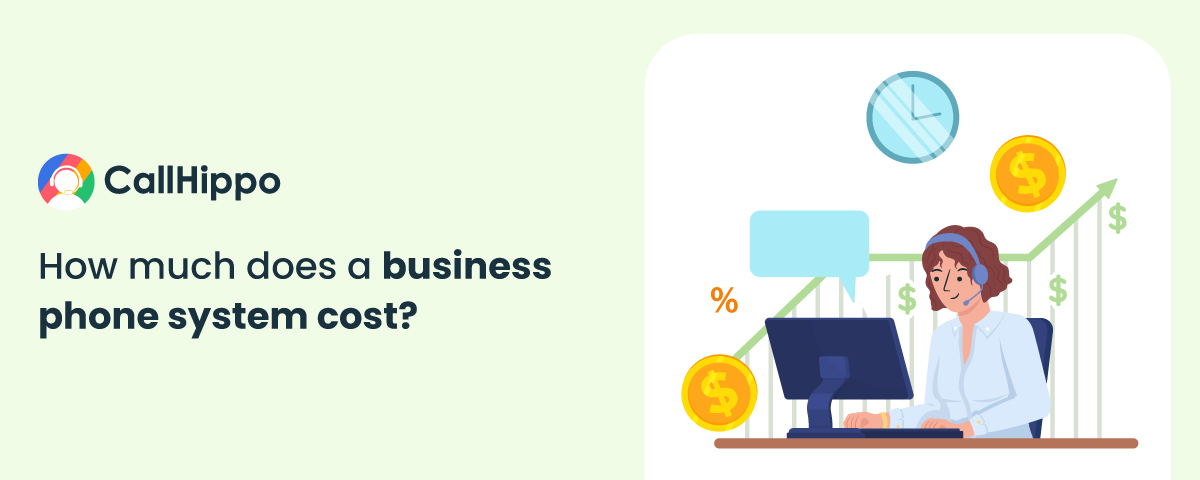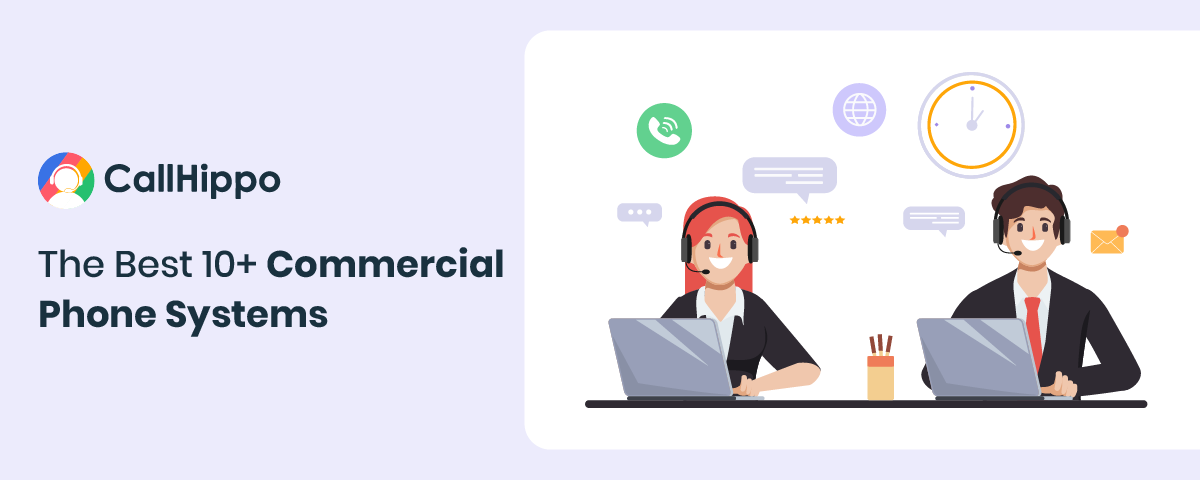Get a Business Phone System
Boost customer communication and simplify operations with a business phone system. Enjoy smart call routing, voicemail, real-time analytics, and seamless scalability. Manage calls from anywhere with a cloud-based solution designed for modern businesses. Stay connected, improve efficiency, and enrich customer satisfaction.

Trusted by 4000+ companies
What is a Business Phone System?
A business phone system is a smart communication solution that helps businesses handle calls smoothly and professionally. Unlike old-fashioned landlines, small business phone systems come with useful features like call forwarding, voicemail, virtual numbers, and automated attendants.
These systems make it easier to manage customer calls, improve response times, and support remote teams. A business telephone system ensures seamless communication, helping businesses stay connected with customers and teams from anywhere, making it an essential part of modern business operations.

How To Get A Phone System for Business?
Follow these five simple steps to set up your business phone system.
Step 1: Sign up on CallHippo and choose your business number.
Step 2: Set up call routing, voicemail, and team extensions.
Step 3: Integrate with CRM and business tools for efficiency.
Step 4: Customize settings for call forwarding and analytics.
Step 5: Start making and receiving calls from any device.
From number buying to inviting your users to making your first call, all it takes to set up your business phone system is 3 minutes.
- Buy Numbers
- Add Users
- Start Calling
- Track Calls

How Do Business Phone Systems Work?
A business phone system manages inbound and outbound calls using advanced telecommunication technology. When a call is initiated, the system processes it through a traditional landline, VoIP, or a cloud-based phone system.
An auto-attendant greets callers with menu options and routes them based on preset rules. Calls are then managed with features like call forwarding, voicemail, call recording, and interactive voice response (IVR), ensuring seamless communication. The system allows easy call transfers between extensions or departments, improving efficiency.
Once the call ends, details are logged for tracking, analytics, and reporting. Additional features like voicemail-to-email, call transcripts, and CRM integration help businesses maintain records and enhance customer interactions.
This organized process ensures businesses can handle communications efficiently and professionally. All these benefits eventually improve customer experience and operational productivity.
Benefits Of CallHippo’s Business Phone System
From cost savings to seamless communication, CallHippo’s business phone system empowers businesses with advanced features, mobility, and scalability to enhance efficiency and customer interactions.
CallHippo’s business phone system eliminates the need for expensive hardware and reduces call costs. Enjoy a cost-effective solution that helps businesses of all sizes save money.
Answer business calls on any device to remain always available. Whether you’re working remotely or traveling, CallHippo ensures seamless communication without missing any calls.
Call forwarding, call recording, and auto-attendants make managing business calls easier. These advanced features help improve communication and enhance customer service.
Conduct high-quality conference calls with ease, allowing team members to connect instantly. CallHippo’s conferencing capabilities ensure clear and seamless communication.
Smart call routing, IVR, and automated responses help you handle customer queries faster. Enhance customer satisfaction by ensuring calls are directed to the right person.
Customized greetings and on-hold music can make your business sound professional. Impress clients with a well-structured communication system that strengthens credibility.
How CallHippo Made the Difference
Proof That Seamless Communication and Smart Strategies Build Unstoppable Momentum.
INTECH Accelerates Efficiency and Reduces Cost with CallHippo's Phone System.


RP Tech Media Sees a 30% Increase in Productivity and ROI with CallHippo.


Finofy Improves 100% Call Quality & Conversion Rates with CallHippo.


Bottega University Increased Efficiency by 20% with CallHippo.


Integrate with Your Preferred Apps
Integrate all the necessary tools from the CallHippo App Marketplace to further streamline your communication processes.
Features of a Small Business Phone System
-
Power Dialer
-
Smart Switch
-
Global Connect
-
Smart Call Forwarding
-
Call Transfer
-
Call Conference
-
Call Queuing Software
-
Call Barging
-
Call Recording
-
Voice Mail
-
Call Analytics
-
On Hold Music
-
Automatic Call Distribution
-
Call Center Analytics
-
Call Monitoring
-
Gamification
-
Interactive Voice Response
-
Multi-line Phone System
-
Number Masking
-
Post-Call Surveys
-
Predictive Dialer
-
SDAP
-
Shared Inbox
-
Target vs. Achievement
-
User Role System
-
Voice Broadcast System
-
Voicemail Greeting
-
VoIP Call Recorder Software
-
Welcome Music or Message
-
Call Screening
-
Call Whispering
-
Call Routing
Pricing
- Unlimited Minutes (Includes Both Landline & Mobile Calling)Free minutes are shared by all account users. Calling on special and premium numbers are excluded. For manual calls only.
- 1 Free Phone NumberEach user gets one free phone number. A single number can be assigned to multiple users for making and receiving calls.
- Smart Dashboard
- Paid Call RecordingAdditional charges of $0.005/min are applicable.
- Multiple Integrations
- User Rights
- Chat Support
- Everything in Bronze +
- Unlimited Minutes (Includes Both Landline & Mobile Calling)Free minutes are shared by all account users. Calling on special and premium numbers are excluded. For manual calls only.
- Live Call
- Role-based Access Control
- Free Call Recordings
- Pause-Resume Recording
- After Call Work
- Call Dispositions
- Everything in Silver +
- Unlimited Minutes (Includes Both Landline & Mobile Calling)Free minutes are shared by all account users. Calling on special and premium numbers are excluded. For manual calls only.
- Auto Dialer (Power, Parallel & Speed to Dial)Telephony extra.
- Unlimited QA Users
- Voice Broadcasting
- AI Reports / AnalyticsSmart reports that summarize user & call activity.
- Single Sign On (SSO)Securely log into multiple apps with one set of credentials.
- AI Smart DID Routing
- Hide Number From Agent
- Free Omnichannel Platform
Talk To Us
- Includes all features from past plans
- Minimum 20 Users
- Unlimited calling to 48 countries
- Customized Add-ons for other countries & SMS
- Power Dialer, Parallel Included
- Speech Analytics Or CallHippo AI included
- Priority Support1-hour response time guarantees, designated support team oversight, tailored proactive monitoring and 24/7 support.
- Custom ReportsCustomised reports for tracking teams KPI's.
- Custom OnboardingPersonalised guidance for feature activation and better usage of core CallHippo features.
- Custom data storage and API usage.
- Developer SupportNeed Developer access for support required in software integration.
- Dedicated Account Manager
- Dedicated Compliance SupportTailored assistance from our Legal and Compliance teams to meet specific cybersecurity and documentation needs.
- Unlimited Minutes (Includes Both Landline & Mobile Calling)Free minutes are shared by all account users. Calling on special and premium numbers are excluded.
- 100 SMS (Text Messages)Standard A2P charges apply.
- 1 Free Phone NumberToll-free number not included.
- Basic Report Analytics
- Everything in Starter +
- Unlimited Minutes (Includes Both Landline & Mobile Calling)Free minutes are shared by all account users. Calling on special and premium numbers are excluded.
- 500 SMS (Text Messages)Standard A2P charges apply.
- Call Recordings
- AI Reports / AnalyticsSmart reports that summarize user & call activity.
- Everything in Professional +
- Unlimited Minutes (Includes Both Landline & Mobile Calling)Free minutes are shared by all account users. Calling on special and premium numbers are excluded.
- 1000 SMS (Text Messages)Standard A2P charges apply.
- Dedicated Account Manager
- Custom Integrations
- Single Sign On (SSO)Securely log into multiple apps with one set of credentials.
Talk To Us
- Includes all features from past plans
- Minimum 20 Users
- Unlimited calling to 48 countries
- Customized Add-ons for other countries & SMS
- Power Dialer, Parallel Included
- Speech Analytics Or CallHippo AI included
- Priority Support1-hour response time guarantees, designated support team oversight, tailored proactive monitoring and 24/7 support.
- Custom ReportsCustomised reports for tracking teams KPI's.
- Custom OnboardingPersonalised guidance for feature activation and better usage of core CallHippo features.
- Custom data storage and API usage.
- Developer SupportNeed Developer access for support required in software integration.
- Dedicated Account Manager
- Dedicated Compliance SupportTailored assistance from our Legal and Compliance teams to meet specific cybersecurity and documentation needs.
-
There are three main types: traditional landline systems, VoIP (Voice over Internet Protocol) systems, and PBX (Private Branch Exchange) systems. VoIP system is the most popular as it offers flexibility, lower costs, and advanced features.
-
To choose the right business phone services, consider factors like business size, budget, required features (call forwarding, analytics, CRM integration), scalability, and remote work support. VoIP systems are great for flexibility, while PBX works well for large businesses.
-
Yes, most modern VoIP and cloud-based phone systems, such as CallHippo allow integration with CRMs, help desks, and other tools to optimize workflows and improve customer interactions.
-
It depends on the system. VoIP systems work with existing computers, mobile phones, and headsets, while traditional PBX systems may require dedicated hardware like desk phones and servers. Here is the guide for business phone system installation.
-
Cloud-based phone systems use encryption, firewalls, and multi-factor authentication to protect data. Choosing a reliable provider with strong security measures ensures safe and secure communication.
-
Many business phone systems include built-in call recording and analytics tools to track performance, monitor customer interactions, and ensure compliance, helping businesses improve service quality.


